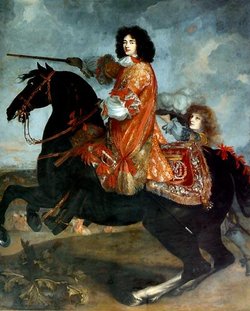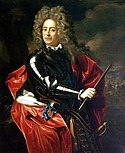Liste der Oberbefehlshaber der britischen Armee
Der Oberbefehlshaber der britischen Armee (engl. Commander-in-Chief of the Forces) war der militärische Führer der britischen Landstreitkräfte von Mitte des 17. Jahrhunderts bis 1904. Aufgrund der Neuordnung der Heeresverwaltung legte Lord Roberts 1904 das Amt als Oberbefehlshaber nieder, welches nun nicht mehr besetzt wurde. Die Funktion des ranghöchsten Soldaten der britischen Armee wurde durch den Chef des Imperialen Generalstabes übernommen. 2008 wurden die konventionellen Kampfkräfte der Armee dem HQ Land Forces unterstellt, dessen Befehlshaber wurde zum Commander-in-Chief, Land Forces.
| Oberbefehlshaber der britischen Armee | von | bis | Bild |
|---|---|---|---|
| James Scott, 1. Duke of Monmouth | 1674 | 1679 |  |
| John Churchill, 1. Duke of Marlborough | 1690 | 1691 |  |
| Meinhard Schomberg, 1. Duke of Leinster | 1691 | 1711 |  |
| James Butler, 2. Duke of Ormonde | 1711 | 1714 |  |
| John Dalrymple, 2. Earl of Stair | 1744 | 1745 |  |
| George Wade | 1745 | 1748 |  |
| John Ligonier, 1. Viscount Ligonier | 1757 | 1759 |  |
| John Manners, Marquess of Granby | 1766 | 1769 |  |
| Jeffrey Amherst, 1. Baron Amherst | 1778 | 1782 |  |
| Henry Seymour Conway | 1782 | 1783 |  |
| Jeffrey Amherst, 1. Baron Amherst | 1783 | 1795 |  |
| Prince Frederick, Duke of York and Albany | 1795 | 1809 |  |
| Sir David Dundas | 1809 | 1811 |  |
| Prince Frederick, Duke of York and Albany | 1811 | 1827 |  |
| Arthur Wellesley, 1. Duke of Wellington | 1827 | 1828 |  |
| Rowland Hill, 1. Viscount Hill | 1828 | 1842 |  |
| Arthur Wellesley, 1. Duke of Wellington | 1842 | 1852 |  |
| Henry Hardinge, 1. Viscount Hardinge | 1852 | 1856 |  |
| Prince George, 2. Duke of Cambridge | 1856 | 1895 | |
| Garnet Wolseley, 1. Viscount Wolseley | 1895 | 1900 |  |
| Frederick Roberts, 1. Earl Roberts | 1900 | 1904 |  |
Auf dieser Seite verwendete Medien
HRH Prince George, Duke of Cambridge
Meinhardt Schomberg, 3rd Duke of Schomberg - Official Portrait
Portrait of Frederick, Duke of York
Henry Hardinge, 1st Viscount Hardinge of Lahore, by William Salter (died 1875). See source website for additional information.
This set of images was gathered by User:Dcoetzee from the National Portrait Gallery, London website using a special tool. All images in this batch have been confirmed as author died before 1939 according to the official death date listed by the NPG.Porträt des Henry Seymour Conway (1721-1795)
J.395.1548 Henry SEYMOUR-CONWAY (1719– 1795), later colonel of Royal Horse Guards Blue, field marshal, pstl/ppr, 60x44, [c.1750] (Lauder family, Derbyshire, c.1920– ; London, Willis’s Rooms, 5.X.1933, £15/10/-. [?Desc.]: Bridgwater, Tamlyn & Son, 16.XI.2010, Lot 330 repr., attr., est. £1500–2500, £1500. Fergus Hall Master Paintings 2011, as by Hoare) ϕσ
Rowland, lord Hill, lieutenant-général britannique. Vétéran des campagnes d'Égypte et d'Espagne, il s'illustre à Waterloo à la tête du 2e corps britannique.
| Caption from the museum's website |
|---|
|
Hot-headed and known for his heavy drinking, the Marquess of Granby (1721-1770) also acquired a reputation for courage and leadership during the Seven Years War (1756-1763). He was given command of the British contingent after the Battle of Minden (1759), returning home to a hero's welcome in 1763. It was a testament to Granby's abilities that the first commission for a full-length portrait of him which Reynolds received was from Duc de Broglie, the French opponent whom Granby had defeated at the Battle of Vellingshausen (or Kirchdenkern), 1761. As the eldest son of the 3rd Duke of Rutland, Granby had considerable advantages and started his career as the MP for Grantham. He was then commissioned as Colonel of the 'Leicester Blues', one of the controversial 'noble' short-service regiments raised to fight Bonnie Prince Charlie, the Young Pretender, in 1745. He became Colonel of the Royal Horse Guards in 1758, Master General of the Ordnance in 1763 and Commander-in-Chief of the Army in 1766. Granby is shown here in his uniform as Master-General of the Ordnance, leaning on a 13-inch land service mortar, with troopers of the Royal Horse Guards riding towards a battle which rages in the distance. |
Sir David Dundas - Official Portrait by Robert Dighton

















